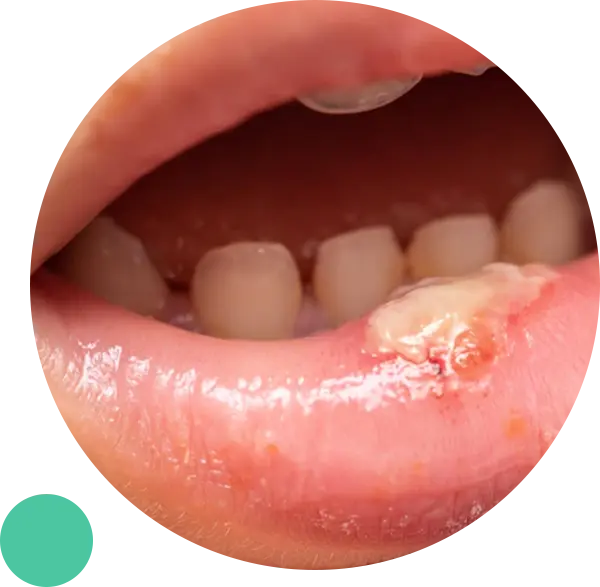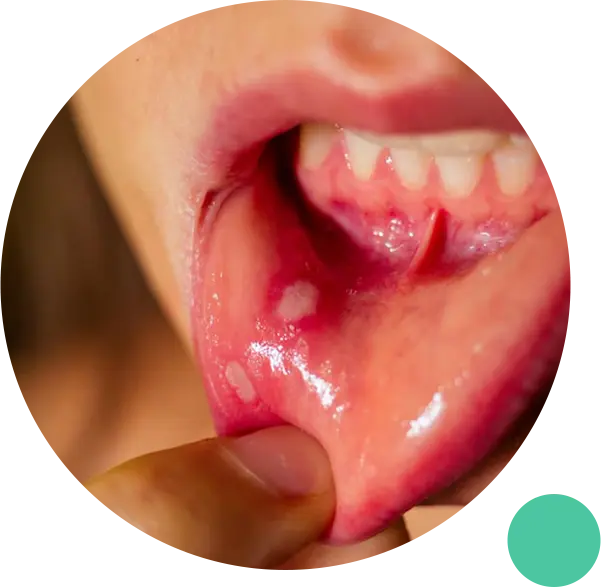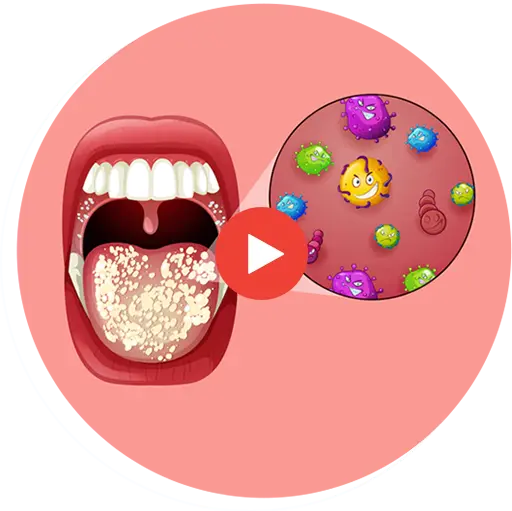

TELMDCARE
Oral Thrush
(oral candidiasis)
Oral thrush, also referred to as oropharyngeal candidiasis, oral candidiasis, or only thrush,
is basically a yeast infection that develops inside the mouth. It's a fairly common
condition, especially in babies and toddlers.
Oral thrush occurs when the fungus called Candida albicans overgrows in the mouth. Usually,
it's a perfectly normal organism that exists in the mouth, but it can cause white lesions to
develop on the tongue and inner cheeks when it overgrows.
And while oral thrush can affect anyone, it's not necessarily dangerous for most people
except those with a very weak immune system.
Book an Appointment for Only
TELMDCARE
What Causes
Oral Thrush?
Simply put, oral thrush is caused by the access of Candida albicans in your mouth. And as
mentioned previously, these aren't exactly foreign bodies, and it's perfectly normal for a
small amount of these to be present in the mouth. They become a problem when their growth is
out of control.
So, what exactly causes them to overgrow?
Well, a weakened immune system.
A stronger immune system ensures that the good bacteria in your body keep the quantity of
fungus Candida albicans in control. But if one's got a compromised immune system, there can
be an overgrowth of Candida albicans, resulting in oral thrush.
Or if there is an imbalance of microorganisms in the body due to reasons like taking
antibiotics or radiation therapy for cancer, that too could lead to oral thrush.
Diabetes is also a major promoter of oral thrush. Mainly because uncontrolled diabetes can
weaken the immune system, causing the blood sugar level to rise. This gives Candida albicans
the perfect environment to overgrow.

TELMDCARE
Is covered by many popular
insurance plans

TELMDCARE
Types of Oral Thrush
Typically, oral thrush is grouped into three categories depending on what it looks like. Sometimes, your condition could be somewhere in between these groups.
Pseudomembranous
This is the most common version of oral thrush that most people have. The one in which there are white cottage cheese-like bumps in the mouth.
Erythematous (Atrophic)
This is mainly different in terms of color. The mouth appears red and raw as opposed to the common white patches.
Hyperplastic
This is also known as plaque-like candidiasis. This is because of the white plaque, which can be pretty hard to remove. This type of oral thrush is the least common and is usually found in HIV patients.
What Causes Oral Thrush?
Most people have low numbers of the fungus Candida in their digestive system and mouth. These can lead to oral thrush.
Oral Thrush
Risk Factors
Severe immune deficiency can lead to oral thrush. It can occur in older adults and infants due to their weakened immunity.
How Can You Tell If You Have Oral Thrush? — Symptoms
In its most early stages, there may be no apparent signs or symptoms of oral thrush. But as the infection progresses, symptoms may start to appear. These are the common symptoms you should be looking for.
Here are a few less common symptoms:
Symptoms in babies:
When breastfeeding babies pass the thrush to their mothers, these symptoms can be seen:
In some rare cases, oral thrush can spread to the esophagus. Once it does, it causes pain when trying to swallow, discomfort in the throat and chest, and fever if the infection spreads further.
How Can Oral Thrush Be Treated?
Oral thrush is fairly easy to treat in healthy adults as well as infants. For people with a
weakened immune system, there may be additional tests and treatments required.
Medical Treatment Options:
Commonly Used Home Remedies:
Your doctor may recommend various home remedies and lifestyle changes to
treat oral thrush.
It's important to maintain good oral hygiene when you're recovering from a health
issue, such as oral thrush. Some of the tips that can help prevent the spread of
bacteria are brushing your teeth and keeping your dentures clean. You should also
replace your toothbrush after you have finished treating your condition.
You can also try using baking soda and water to rinse your mouth. Other home
remedies include saltwater and apple cider vinegar. You can also try drinking yogurt
that has beneficial bacteria or taking probiotic supplements. Before you start
giving these supplements to your infant, consult a doctor.
TELMDCARE
As Seen On


Get Affordable Online Healthcare at
TelMDCare for Oral Thrush
Our certified physicians at TelMDCare can help treat your oral thrush or any other medical
condition that you're dealing with. All you need to do is book an appointment with our
online doctors.
Our doctors will give you a diagnosis and prescriptions if needed. Our urgent care
consultations are available at a very reasonable rate of $43, with the first follow-up being
completely free of cost. Sign up and book an appointment today!
TELMDCARE
Sign Up
Our best online doctors on call ensure that the services we provide are adequate, high
quality,
and affordable.
Get in touch with us today for more details or
Sign Up for a quick consultation.
$43 SIGN UP
TELMDCARE
Common Oral Thrush FAQs
Those with a weakened immune system and those with diabetes are very likely to develop oral thrush. Mothers with vaginal yeast infections can also pass it to the baby as oral thrush. Moreover, those on antibiotics and those who wear dentures are also high on the list of people at risk.
02How Can I Prevent Oral Thrush?Oral thrush can be prevented with a few simple measures:
Yes, a doctor can prescribe the right medication to help you treat the thrush faster. Moreover, oral thrush is less common in healthy teenagers and adults. You may want to check in with a doctor to see if there are underlying conditions causing it.



